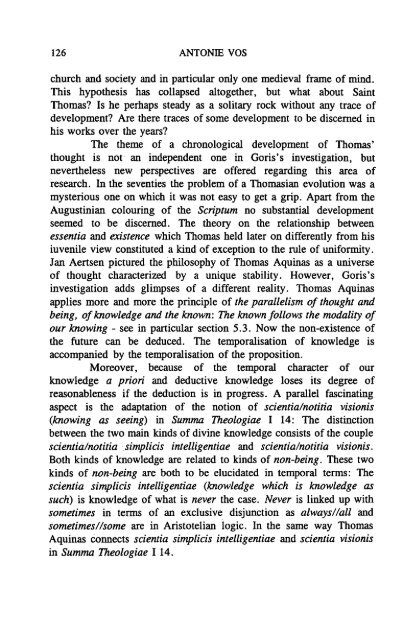Jaarboek Thomas Instituut 1997 - Thomas Instituut te Utrecht
Jaarboek Thomas Instituut 1997 - Thomas Instituut te Utrecht
Jaarboek Thomas Instituut 1997 - Thomas Instituut te Utrecht
Create successful ePaper yourself
Turn your PDF publications into a flip-book with our unique Google optimized e-Paper software.
126 ANTONIE VOS<br />
church and society and in particular only one medieval frame of mind.<br />
This hypothesis has collapsed altogether, but what about Saint<br />
<strong>Thomas</strong>? Is he perhaps s<strong>te</strong>ady as a solitary rock without any trace of<br />
development? Are there traces of some development to be discerned in<br />
his works over the years?<br />
The theme of a chronological development of <strong>Thomas</strong>'<br />
thought is not an independent one in Goris's investigation, but<br />
nevertheless new perspectives are offered regarding this area of<br />
research. In the seventies the problem of a <strong>Thomas</strong>ian evolution was a<br />
mys<strong>te</strong>rious one on which it was not easy to get a grip. Apart from the<br />
Augustinian colouring of the Scriptum no substantial development<br />
seemed to be discerned. The theory on the relationship between<br />
essentia and exis<strong>te</strong>nce which <strong>Thomas</strong> held la<strong>te</strong>r on differently from his<br />
iuvenile view constitu<strong>te</strong>d a kind of exception to the rule of uniformity.<br />
Jan Aertsen pictured the philosophy of <strong>Thomas</strong> Aquinas as a universe<br />
of thought charac<strong>te</strong>rized by a unique stability. However, Goris's<br />
investigation adds glimpses of a different reality. <strong>Thomas</strong> Aquinas<br />
applies more and more the principle of the parallelism of thought and<br />
being, of knowledge and the known: The known follows the modality of<br />
our knowing - see in particular section 5.3. Now the non-exis<strong>te</strong>nce of<br />
the future can be deduced. The <strong>te</strong>mporalisation of knowledge is<br />
accompanied by the <strong>te</strong>mporalisation of the proposition.<br />
Moreover, because of the <strong>te</strong>mporal charac<strong>te</strong>r of our<br />
knowledge a priori and deductive knowledge loses its degree of<br />
reasonableness if the deduction is in progress. A parallel fascinating<br />
aspect is the adaptation of the notion of scientia/notitia visionis<br />
(knowing as seeing) in Summa Theologiae I 14: The distinction<br />
between the two main kinds of divine knowledge consists of the couple<br />
scientia/notitia simplicis in<strong>te</strong>lligentiae and scieniia/notitia visionis.<br />
Both kinds of knowledge are rela<strong>te</strong>d to kinds of non-being. These two<br />
kinds of non-being are both to be elucida<strong>te</strong>d in <strong>te</strong>mporal <strong>te</strong>rms: The<br />
scientia simplicis in<strong>te</strong>lligentiae (knowledge which is knowledge as<br />
such) is knowledge of what is never the case. Never is linked up with<br />
sometimes in <strong>te</strong>rms of an exclusive disjunction as always/fall and<br />
sometimes//some are in Aristo<strong>te</strong>lian logic. In the same way <strong>Thomas</strong><br />
Aquinas Connects scientia simplicis in<strong>te</strong>lligentiae and scientia visionis<br />
in Summa Theologiae I 14.








